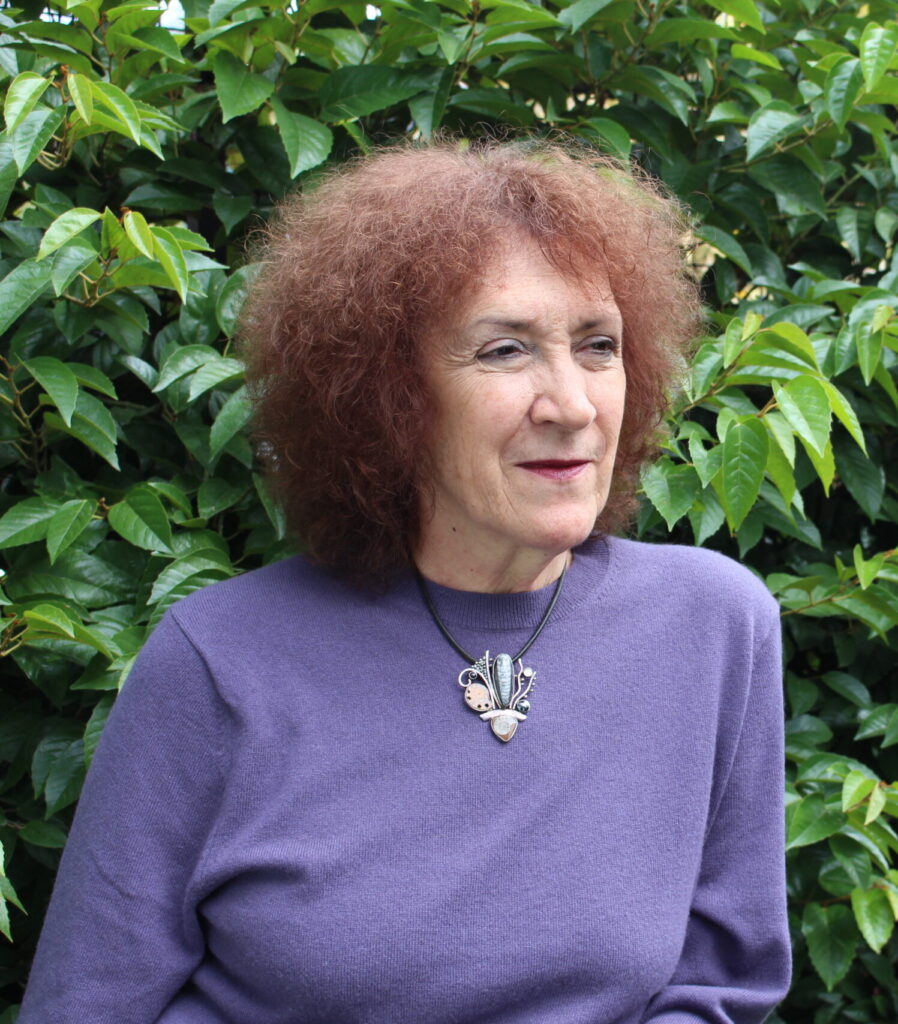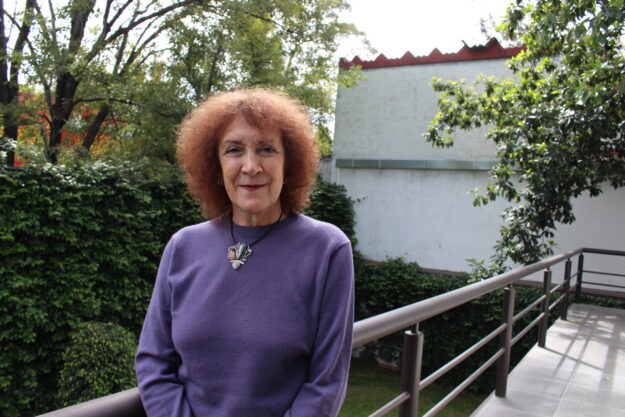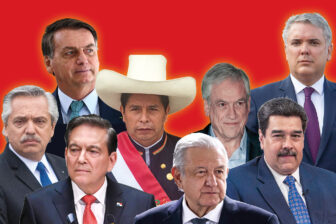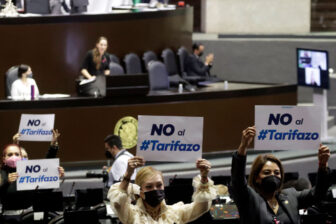Julia Tagüeña Parga woke up in good spirits on Oct. 21, 2020. It was her 72nd birthday, and her grandkids were coming to visit her in Cuernavaca, a few hours’ drive outside Mexico City. She’d just won a prestigious award honoring her five decades of work as a champion of scientific research in Mexico. Celebrations were in order.
Then Tagüeña flipped on President Andrés Manuel López Obrador’s daily morning press conference, and her life turned upside down.
On screen, Tagüeña saw the director of Mexico’s science and technology council (CONACYT) standing next to the president and accusing her of misusing government funds. That was the moment Tagüeña realized she was at the center of a brewing political storm, she told AQ in November.
The months that followed would pit some of the country’s brightest minds against its most powerful government figures, and stoke fears that the president and his allies sought to silence critical voices in academia and beyond. Journalists, NGOs and prominent business leaders had already accused the government of stifling dissent in the name of anti-corruption. Tensions would soon boil over between administration officials, including the head of CONACYT, and faculty and students at the Center for Research and Teaching in Economics (CIDE).
When the charges against her first came to light, Tagüeña couldn’t foresee how her case would become wrapped up in a broader debate over the purpose and limits of scientific inquiry in López Obrador’s Mexico. But in August 2021 and again in September, Mexico’s attorney general asked a federal judge to arrest Tagüeña and 30 other scientists, academics and administrators on charges of organized crime and money laundering. It seemed absurd. But if the judge in the case agreed, Tagüeña’s male colleagues would be sent to the same prison that once held Joaquín “El Chapo” Guzmán; she would be sent to the equivalent facility for women.
“Suddenly the judge who deals with the worst criminals in the country has astronomers, economists and physicists in front of him,” Tagüeña recalled.
The charges against Tagüeña and her colleagues started with a complaint from CONACYT to the attorney general’s office, alleging that former employees and advisory board members had colluded to transfer millions of dollars from the council to the board over a six-year period. The attorney general alleged that the money had been used inappropriately for trips, meals and other expenses. Tagüeña, who in that time served in CONACYT’s leadership before moving on to lead the advisory board, was also accused of conflict of interest by authorizing public funds for a project run by her physicist husband. The new CONACYT leadership attempted to bar her from holding a public job for 10 years.
“All the receipts were provided and everything was approved,” said Tagüeña, who maintains she is “completely innocent.”
In December, a federal court shut down the effort to bar Tagüeña from future jobs. But while a judge has twice refused to issue arrest warrants in the broader case against her and her colleagues, the attorney general’s office has insisted on keeping its investigation open. In the meantime, the public scrutiny and accusations have upended Tagüeña’s professional and personal lives.
“The situation has kept me from organizing my future. I’m living in the present, day by day,” Tagüeña said.
“We are not the enemy”
Tagüeña’s conflict with the López Obrador administration was far from inevitable, not least because she supports much of what the president is trying to accomplish.
“I am convinced my country needs improvement and I was completely in agreement with many of the problems that this government is trying to solve,” Tagüeña said.
She’s also one of the country’s foremost scientists, beloved in academic circles and a true Mexican success story.
A professor and researcher at UNAM, Mexico’s leading public university, Tagüeña is an expert in solid-state physics and studies topics like electromagnetism, superconductivity and renewable energy. In 1985, she and her husband, Manuel Martínez, an expert in solar energy, helped establish a solar energy lab in Temixco, near Cuernavaca. The lab has since grown into UNAM’s Institute of Renewable Energies.
Tagüeña and Martínez met in high school, and studied together as undergraduates at UNAM before earning their Ph.Ds. at Oxford University. Her exposure to science came at an early age. Born in 1948 in what is today the Czech Republic, Tagüeña grew up in a “family of survivors.” Her parents were Spanish communists who had fled after the country’s civil war. Her father, Manuel Tagüeña, was a celebrated colonel in the Spanish Republican Army and a physicist who “would read from the encyclopedia at the dinner table.” Her mother, Carmen Parga, was a teacher who studied philosophy “but was keen on scientific issues.” After the death of Joseph Stalin in 1953, having grown disillusioned by Soviet communism and feeling “politically very unsafe,” the family fled again. They finally found a home in Mexico.

Tagüeña says that calls for her arrest “make me wonder how it was for (my parents) … This is really the first time in my life that I’ve been persecuted.”
For his part, López Obrador has made light of Tagüeña and her colleagues’ concerns, saying that “those who owe nothing, fear nothing.” He has also criticized their “extravagance” and “waste” and described their requests for funding as “blackmail.”
Those criticisms fit a broader pattern in which López Obrador often accuses traditional institutions of being part of a “mafia of power.” The president was elected less than a year after an investigation by news site Animal Político and civil society group Mexicanos Contra la Corrupción y la Impunidad found that public universities had misused or diverted millions of dollars in 2013 and 2014. The scandal led to ongoing criminal investigations and helped fuel demands for the kind of reckoning with corruption that López Obrador promised as a candidate.
But even some of the president’s key allies have expressed concern over the recent showdown.
“If you ask me what side I’m on, I’m on the side of the scientists,” said Ricardo Monreal, the Senate majority leader from López Obrador’s party. Mexico City Mayor Claudia Sheinbaum, herself a physicist who is close to the president and is considered a frontrunner to replace him in 2024, called the charges of organized crime “excessive.”
“We are not the enemy,” said Tagüeña.
A reckoning – or revenge?
Tagüeña disagrees with the president on significant issues. Her enthusiasm for renewable energy, for example, comes in stark contrast to López Obrador’s focus on fossil fuels. But she doesn’t blame him for her current trials. Instead, Tagüeña believes that the president’s advisers have misinformed him, and that personal conflict and disagreements within the scientific community may be driving the move against her.
Indeed, there has been a palpable shift in academic priorities since López Obrador took office at the end of 2018. At CONACYT that starts with María Elena Álvarez-Buylla, a geneticist known for her vocal opposition to transgenics, who López Obrador tapped to lead the council after his election.
Points of tension between Álvarez-Buylla and Tagüeña arose from the start. In early 2019, Tagüeña left her leadership role at CONACYT to become coordinator of the council’s independent advisory board, officially known as the Foro Consultivo Científico y Tecnológico (Scientific Technological Advisory Forum). Created in 2002 by a national science law, the board was intended to give the scientific community an outlet to advise officials on public policy.
“The idea was to try and create links between the public and private sectors and prevent good science from being decoupled from the economy and environment,” Alejandro Frank, a physicist at UNAM, told AQ.
But this mission soon put the advisory board, including Tagüeña, at odds with Álvarez-Buylla.
First, a series of austerity measures led to cuts in research and scholarship funding. Álvarez-Buylla, a critic of what she has called Mexico’s “neoliberal science,” defended the cuts. She declined AQ’s request for an interview.
A year later, Tagüeña resigned her position as coordinator of CONACYT’s independent advisory board, citing the new budget restraints. When CONACYT officials then proposed a bill to replace the 2002 science law, she saw it as an attempt to further sideline the advisory board and centralize science policy.
“(Álvarez-Buylla) is using her ideology to change CONACYT and the system of science and technology and innovation,” said Tagüeña. “What CONACYT wants is a concentration of power in CONACYT, and the scientific community doesn’t agree.”
Joined by other scientists and advocacy groups, Tagüeña was at the center of resistance to the new proposal.
“It was Julia who started the movement … We think that brought the ire from CONACYT’s leadership,” David Romero, a professor in molecular genetics at UNAM, told AQ.
Many observers initially welcomed Álvarez-Buylla’s nomination to lead CONACYT. But today critics fear that she and Attorney General Alejandro Gertz Manero, who has had his own past conflict with the scientific community, are punishing those who oppose the administration’s approach to science.
“We’ve always fought to have scientists there (at CONACYT’s helm),” said Frank, who at first was happy to have a researcher leading the council. “But when they finally got there, it became tragic.”
An uncertain future
Tagüeña has long wanted the general public, particularly women and girls, to value science. As a high schooler in the 1960s, she remembers how the space race “made physics fashionable” and “suddenly science became something that was useful to the government.” To try to make physics popular again, she has authored numerous textbooks and provided expertise in the planning and management of science museums. An exposition on energy that she designed for Mexico’s Universum science museum remains “one of the best things I have done in my life,” she told AQ.
In November, even as the charges against her and her colleagues drew international scrutiny, Tagüeña was awarded the Public Understanding and Popularization of Science Prize by the World Academy of Sciences. She was staying busy when AQ spoke to her: teaching an undergraduate course on renewable energy engineering, co-writing a paper on research policy and speaking on a panel about science as a human right.
Though Tagüeña and her colleagues’ legal future is uncertain, the case against them has highlighted the resonance of anti-corruption politics in Mexico, as well as the changing – and challenging – efforts to clean up government, said Eduardo Bohórquez, the executive director of Mexico’s chapter of Transparency International.
“Socially, the concept of what is considered corruption is changing, and the López Obrador administration has been pursuing a lot of behaviors that legally speaking may not be corruption,” Bohórquez told AQ, noting that what may have once been judged as administrative failures on the scientists’ part are today being evaluated differently.
Tagüeña said she is open to a better way of doing things and will accept criticism “in the normal way science accepts criticism: based on data.”
“What I don’t want is to hear is something from an ideological point of view,” Tagüeña said.
At the time of publication, Tagüeña had contacted the Inter-American Court of Human Rights about the charges against her. She had not faced a judge and was hoping that the attorney general’s office would close her case. She was worried, she said, but noted that the episode was not just about her, or about any one scientist:
“What happens on this issue will decide what happens to this country.”









